MASCARO CENTER FOR SUSTAINABLE INNOVATION
2024-25 YEAR IN REVIEW















We share with you the 2024–25 Year in Review for the Mascaro Center for Sustainable Innovation (MCSI) This year, our work at MCSI has continued to grow as a collaborative, interdisciplinary hub for sustainability—advancing research, education, and engagement to address some of the most pressing challenges of our time.
At MCSI, we do our sustainability work by catalyzing innovative research, expanding educational opportunities, and deepening partnerships that translate ideas into action.
This year, our community made remarkable strides. Together, we:
Supported transformative research through Seed Grants and John C. Mascaro Awards, which generated over $2.9 million in follow-on funding.
Partnered with colleagues across campus to leverage opportunities, such as leading our Sustainability Community of Practice for RDS@Pitt and cosponsoring the Sustainability in Healthcare Challenge with the Office of Sustainability in the Health Sciences.
Expanded educational opportunities, reaching hundreds of Pitt students and staff through courses, certificates, and immersive experiences This year, 78 students graduated with sustainability credentials, and over 100 new students entered our academic programs.
Strengthened community partnerships through programs such as summer research, K–12 educator engagement, and public storytelling events that brought science and sustainability to broader audiences.
We are proud of these accomplishments, but we know they are only possible through collaboration—across disciplines, across campus, and with our regional and global partners As you read through these highlights, we invite you to join us in envisioning and building the more sustainable future we know is possible.
With gratitude and optimism,
Melissa M. Bilec and Gena
Kovalcik
Co-Directors, Mascaro Center for Sustainable Innovation

The Mascaro Center’s mission is to co-create research, education, and engagement opportunities by fostering critical connections to solve the complex challenges facing our planet while cocreating more just, equitable, and sustainable communities at the University, within the region, and around the world.

MCSI is a collaborative, interdisciplinary hub of sustainability at the University of Pittsburgh that is:
catalyzing and expanding our research capacity to accelerate equitable solutions to pressing sustainability challenges;
creating research that informs policies, practices, and technologies that promote sustainability at campus, local, regional, and global scales;
serving as a beacon for sustainability education by offering local and global interdisciplinary programs and experiential learning opportunities that empower members of the Pitt community to become change agents for sustainability; and
nurturing a community that fosters critical thinking, creativity, and a passion for sustainability.

Melissa M. Bilec
Co-Director and Special Assistant to the Provost for Sustainability mbilec@pitt.edu

Esmée de Cortie
Sustainability Community Engagement Coordinator esmee.decortie@pitt.edu

Gena M. Kovalcik Co-Director gmk9@pitt.edu

David V. P. Sanchez
Associate Director david.sanchez@pitt.edu

Savannah Denlinger
Sustainability Academic Programs Manager sld127@pitt.edu

Mary Schrag
Administrative Coordinator mas1752@pitt.edu


MCSI aims to catalyze and expand Pitt’s research capacity to accelerate equitable solutions to pressing sustainability challenges. With our faculty partners, MCSI conducts research that informs policies, practices, and technologies that promote sustainability at the campus, local, regional, and global scales.









Connecting research efforts across Pitt's academic schools and centers helps us to produce a larger impact.
Regenerative Solutions
Prioritizes advancing quality of life within planetary boundaries, recognizing that our current models of production and consumption are unsustainable.
Thriving Futures
Supports and promotes community-engaged solutions, leveraging the realities of regional change to build sustainable futures.
Resilient Ecological Systems
Facilitates the understanding of how natural ecosystems are built, how they function, and how natural and human disturbances impact these systems, and then helps with resistance and recovery.
Environmental Discourse
Focuses on creative, critical, curatorial, communicative, and political dimensions of sustainability research and challenges.

Education & Engagement
Synthesizes Pitt’s expertise and partnerships in sustainability into cohesive knowledge for both our students and our local and global communities.

Water Equity Circular Economy
Sustainable Materials
Complex Sustainable Systems
Just Energy Transition

LEAD: Goetz Veser
Engineering
De/GrowthPreserving
OurPastto
UnderstandOurFuture
ClimateAnxiety
EnvironmentalJustice, FilmStudies,&Media
Disinformation

LEAD: Ruth Mostern
History
Climate & Health Sustainable
Healthcare Urban Food
Community Resilience and
Equitable Built Environments

LEAD: Tina Ndoh
Public Health
Water
Ecosystems
Biodiversity
Ecological Justice &
Natural Resources


Translate Sustainability Knowledge
Novel Interdisciplinary Student Experiences
Focus on Impact & Innovation
Enhanced Extracurricular Opportunities

LEAD: David Sanchez
Engineering
LEADS: Justin Kitzes
Cori Zawacki Biological Sciences
“Using LoRa Technology for Long-Term Real-Time Monitoring of Ecological Systems” 2025-26 awards
MarkusChmielus,mechanicalengineeringandmaterials
IanNettleship,mechanicalengineeringandmaterials
“FabricationofLow-CostHigh-CapacityCeramicFiltersvia BinderJetAdditiveManufacturingfromClayFeedstockand SustainableBinders”
Richard Henker,nursing
Shanti Gamper-Rabindran, public & international affairs
Morgan Frank, computing and information
Brandon Grainger, electrical engineering
“Electrical Engineering Skills to Support Electrification
Innovation: An Interdisciplinary Approach”
Cori Richards-Zawacki, biological sciences
Justin Kitzes, biological sciences
Daniel Mosse, computing and information

“Guided Regional Anesthesia Education –A Collaboration Between the Universityof PittsburghandLao Friends Nurse AnesthesiaHospital for Children”

Liz Caruso, innovation and entrepreneurship
“Mission Driven Innovation Lab to Engage Sustainability Challenges for Public Impact”
Junyu Liu, computing and information
“Software Toolkit of Estimating and Optimizing Energy Sustainability for Quantum Computers Advancing Sustainability in a Low-Resource Setting “
Cynthia Ofori-Boateng, chemical engineering, Pitt Johnstown
“Sustainable Utilization of Waste Materials for Green Fuels and Bio-Chemicals “




Low-cost ceramic water filters made with local clays are amongst the most effective and sustainable solutions for point-of-usewater treatment.
The overall objective of this research is to create BinderJet Print (BJP) water filters made using geo-polymer binders with sustainable materials and highly permeable porous structures, which can replace commercial synthetic BJP binders.
These low-cost water filters will enable bacterial filtration at a lower cost with increased permeability and faster filtration rates.


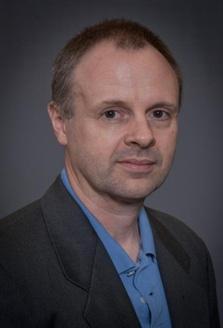


Energy patents in the US Patent Database will be identified and used to find engineers represented in the Revelio database, which provides resumes with standardized information on workers’ education, certifications, skills, and job history.
POTENTIAL IMPACT
This proof-of-concept project aims to examine and provide description of the skills, education, and certification of engineers who work in energy innovation.
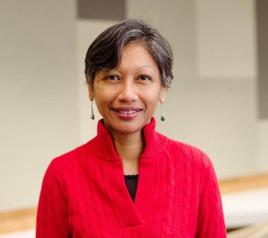
Shanti Gamper-Rabindran Public and International Affairs, Law, and Economics
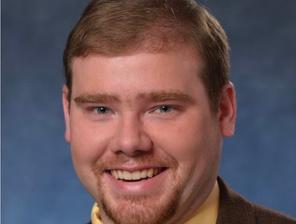




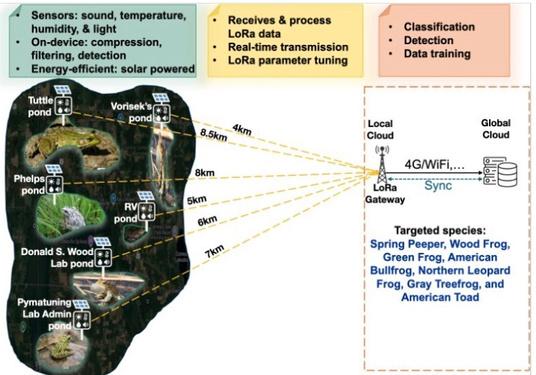
This research involves the creation of a real-time, self-powered, wireless sensor network for ecological monitoring that can improve predictions of amphibian breeding and phenology and enable targeted in-person data collection.


This method has significant implications for conservation of amphibians, which are the most threatened vertebrate group globally, and this can be adapted for monitoring other taxa, including birds, bats, and insects.


The goal of this project is to promote the use of regional anesthesia to reduce reliance on inhaled anesthetics with high global warming potential.
This use reduction can decrease the carbon footprint of surgical care, promote low-resource, high-impact anesthesia practices, and increase quality and safety by improving pain control and reducing risk of complications.

Richard Henker Nurse Anesthesia

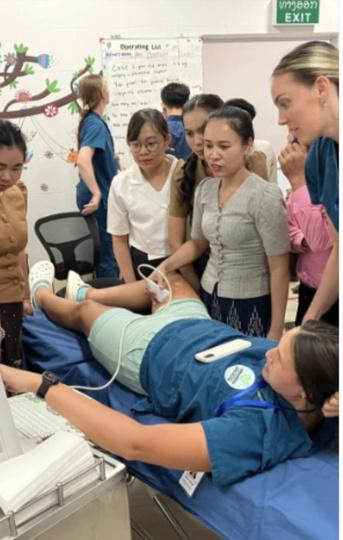
JOHN C. MASCARO AWARDS

The innovation lab will enhance the student experience through experiential learning, community engagement, teamwork, lean innovation principles, project management, and public speaking. Students in the lab will solve real-world, public-sector sustainability problems, one semester at a time.
Skills learned in the lab will equip future change makers to tackle complex societal challenges.


JOHN C. MASCARO AWARDS
Through his research, this project aims to establish a practical quantum energy advantage over classical systems by developing Qenergy, a software for systematic energy estimation and optimization across quantum hardware. This research explores areas where quantum computing can be exponentially more efficient in tasks like machine learning and optimization.
By covering the full quantum stack algorithms, data structures, and interfaces Qenergy supports both near-term and fault-tolerant applications, which can maximize energy sustainability.


JOHN C. MASCARO AWARDS

Through this project, students convert waste into valuable products via reducing, reusing and recycling for socioeconomic, thermodynamic, and environmental sustainability.
Converting waste materials to products will engage and educate students in the use of green technologies to achieve circular economy.








MCSI collaborated with the Office of Sustainability in the Health Sciences, the Office of Multidisciplinary Innovations in the Health Sciences, and the Clinical and Translational Science Institute (CTSI) to support the Pitt Sustainability in Healthcare Challenge as a unique funding opportunity to advance sustainability in health care.
J. Peter Rubin, medicine
“Reducing Operating Room Waste and Cost Through a New EMR Application that Promotes Surgeon Engagement and Uses AI Monitoring for Instrument and Single Use Item Management”
Markus Chmielus, mechanical engineering & materials science
“Additively Manufactured Sustainable Filters for Healthcare Applications”
Natasa Vidic, industrial engineering
“Optimizing STAT Medevac Dispatch for Field Efficiency and Carbon Footprint Reduction”
Isabella Angelelli, medicine
“Development of a Reusable Pulse Oximeter Prototype Functional in Clinical Settings”

William Schuck, Max Chiang, Marissa Varshine, Peter Vassil, Ellie Velasquez “Eco-Engineering the Future: Sustainable Prosthetics for Sustainable Healthcare
MCSI STUDENT RESEARCHERS WERE AMONG 4
Presentation Winner Poster Competition Winners
Greenhouse Gas Inventory and Targets Neeha Kolli
Education:
Neha Devineni, Brandon Sia, Jenny Snyder, and Mary Lazaris
Reducing Food Waste in Healthcare
Research:
Nnenna Ekoh
Reducing Single-use Plastic Waste in Healthcare


Results from MCSI seeding funding take the form of external follow-on funding, publications, presentations, and innovation.
We are proud to share some recent outcomes from our programs and funding.
IN 2024-25, OVER $2.89 MILLION IN FOLLOW-ON FUNDING WAS GENERATED FROM MCSI SEED GRANTS.
Under the leadership of Dr. Melissa Bilec and Housing Innovation Alliance's Dennis Steigerwalt, the University of Pittsburgh has been awarded a Research Partnerships grant through HUD. This $1 million research initiative, launched in February 2025, will span over 16 months and is supported by a $500,000 grant from HUD’s Policy Development & Research Team, which has been matched by the Housing Innovation Alliance, along with contributions from the University of Pittsburgh’s Mascaro Center for Sustainable Innovation.
The project aims to establish a comprehensive platform for delivering innovative housing solutions, with an emphasis on consumer-driven design and constructability. To accomplish this, the researchers will deploy multiple strategies, such as activating a “living lab” within The Picket Fence concept home to gather consumer insights, enhancing material efficiency in new construction, prioritizing systems-built housing approaches, and partnering closely with industry stakeholders to accelerate the development and widespread adoption of these solutions.











MCSI is leading university efforts to infuse sustainability into undergraduate and graduate education and coordinate service learning and cross-disciplinary academic collaborations across campus.










We support education programs impacting a variety of end users including prospective and first-year students, Pitt staff, and the broader community.
GRADUATED LAST YEAR WITH SUSTAINABILITY CREDENTIALS
100
658
STUDENTS ENGAGED WITH FIRST-YEAR SUSTAINABILITY PRESENTATIONS: 10%
INCREASE FROM PREVIOUS YEARS
NEW STUDENTS ENTERED OUR ACADEMIC PROGRAMS
68
INDIVIDUALS COMPLETED THEIR SUSTAINABILITY PROFESSIONAL DEVELOPMENT CERTIFICATES
385
EMPLOYEES REACHED THROUGH COURSES CO-TAUGHT BY MCSI AND OFFICE OF SUSTAINABILITY STAFF +
241
EMPLOYEES REACHED THROUGH COURSES CO-TAUGHT BY MCSI AND OFFICE OF SUSTAINABILITY STAFF

New campus sustainability tours provided by Mascaro Center interns are reaching prospective, admitted, and current Pitt students
a tour to students from
Building upon students’ experience and skills, the project-based Sustainability Capstone course led by David Sanchez and Tony Kerzmann enables interdisciplinary student teams to synthesize comprehensive solutions to complex, real-world sustainability challenges.
INDIVIDUALS ATTENDED CLASSES
IN FY25 COMPARED TO 201 IN FY24 PROJECTS WITH EXTERNAL PARTNERS
Capstone Groups are matched with an industry, government or community partner to work towards a sustainability goal.










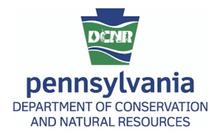


A team of students conducted a policy scan, mapped out community assets, and provided recommendations for how New Sun Rising might be able to establish a Career Technical Education pathway in Westinghouse School with local partners.
The project focused on workforce development and environmental stewardship with the hope that local students would eventually be able to participate and lead many of the local sustainability initiatives as a part of their careers.
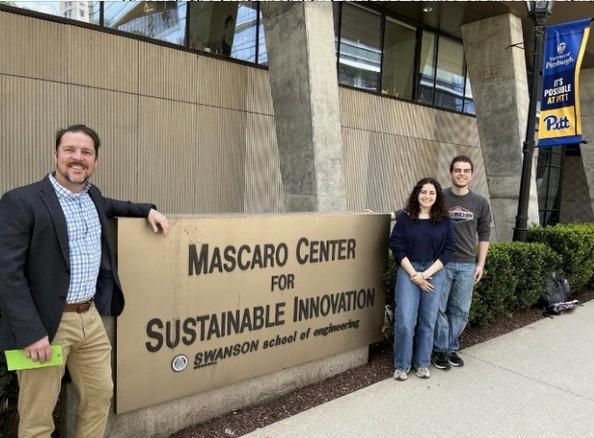
Through the Sustainability Capstone course, students designed an extensive solar project for a medical complex in Hersey, Pennsylvania. They then entered the National Renewable Energy Laboratory (NREL) Solar District Cup. The competition challenged 81 interdisciplinary teams across six divisions to design a solar project from scratch.
In its first year competing, the Pitt team placed first in its division and were runners-up for the entire competition.
The team included: Dalia Chemaitilly, Fiorente Pampena, Siva Surulivel and John Ufer.



Over the past 20 years, MCSI’s summer research program has supported over 400 students. In Summer 2025, this MCSI program supported 25 undergraduate and master's students from 18 different departments including environmental science, engineering, chemistry, biology, anthropology, nutrition and dietetics, and teacher education. As a part of the program, students participate in regular lunch and learn education opportunities and engage in important service-learning projects in the region.

Students assisted shoppers in the Pittsburgh Food Bank Marketplace and packaged bulk food into easily distributed packages. Students were able to assist over 100 food pantry shoppers and packed 1,000 units of food.

Students sorted and organized medical supplies such as needles, sutures, catheters, wound dressing, and other essential items to be shipped to communities in need around the world.

MCSI IS ESPECIALLY THANKFUL TO THE FOLLOWING DONORS WHO MAKE THIS PROGRAM POSSIBLE EACH YEAR!






Keanna Marcelo, environmental science
Surveying the Woody Vegetation across Powdermill Nature
Reserve to Track Change Over Time
Advisor: Andrea Kautz, Carnegie Museum of Natural History
Riya Kothari, bioengineering
Development of Reusable Pulse Oximeter Prototype
Advisor: Kevin Bell, Bioengineeering
Sasha Roth, engineering
Additive Manufacturing of Nonclassical Alloys with Multi-Principal Elements for Improved Sustainability
Advisor: Wei Xiong, Mechanical Engineering

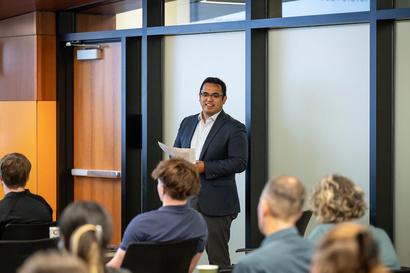






Tony Kerzmann
Mechanical engineering
MCSI Len Peters Faculty Fellow


ony developed and led Plus3 Netherlands, sustainability study abroad program.
4 engineering and 10 honors students raveled through Amsterdam and Rotterdam
o learn firsthand about sustainability!



Joaquin Rodriguez Chemical engineering
MCSI Len Peters Faculty Fellow
senior students presented 64 11 projects 20 judges from industry and academia participated

Canada
Strategic development of wind energy
Israel
Pigment sedimentation at plant sewage

Australia
Cloud seeding to fight bushfires
Saudi Arabia
Carno capture in Saudi
Arabia
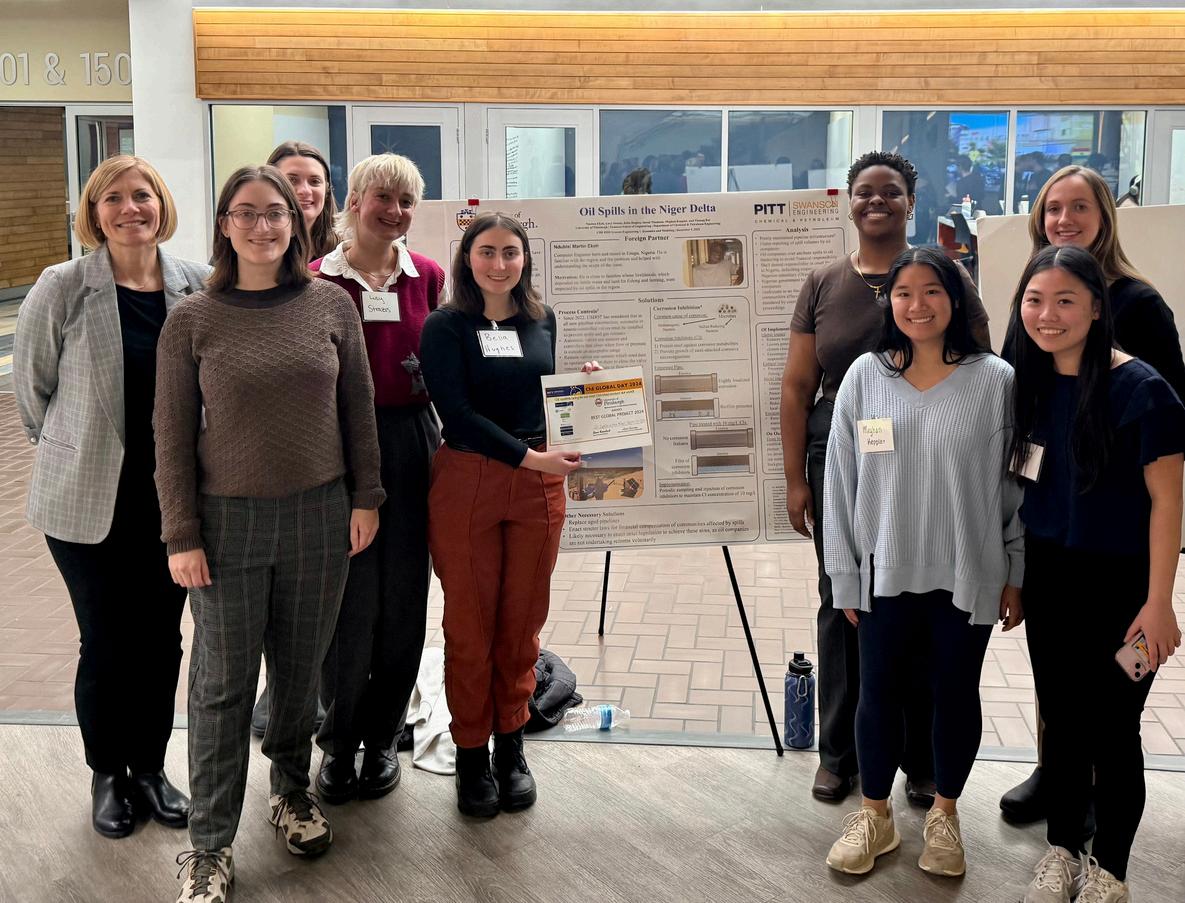
(
Mascaro
Award
Gena
Best
to

Germany
Improving renewable energy grid
stability & implementing AI to enhance waste sorting and precision
Niger
Chile
Mitigating ground-water depletion at copper mine facilities
Niger Delta oil spills Egypt
Singapore
Using slug catchers to combat slug flow in petroleum piping
The Egyptian water crisis India




Computer Science
Partnered with a local food waste recovery organization to address the food insecurity issue facing Pittsburgh Shi utilized AI to improve the existing app by making donated food visible on the app for volunteers to deliver to those who need it so that donated food doesn’t become food waste.



Business
Developed a new 3-credit undergraduate course on sustainability in supply chain and operations to fill a previous gap in the education available to students. The course has no pre-requisites, so any students within the University can enroll.

STEM Education at Pitt Johnstown
Developed a STEM Endorsement for current K-12 teachers to examine connections between their lessons, science literacy, and sustainability. Teachers learn how to better incorporate sustainability into their curriculum, utilize technological resources, and create interdisciplinary connections for their students.



MCSI brings together faculty, staff, students, and external friends to engage in dialogue on a wide variety of sustainability topics.









MCSI hosted ~15 high school students in the Clean Water Academy with ALCOSAN for two weeks. They visited makerspaces and labs, and on the final day presented on an Environmental Engineering Design challenge to ALCOSAN leadership.


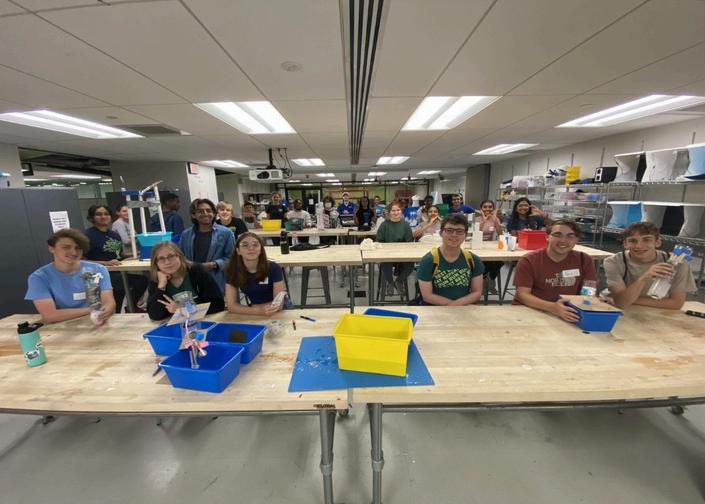
MCSI and ATA continued a long running partnership this year when MCSI staff guestjudged at their student science fair. Students were then invited on campus to participate in a green STEAM design and build workshop and tour green lab spaces and campus sustainability highlights.
MCSI spent two days guest lecturing in 7th and 8th grade science classes. Students learned about wind powered energy sources and built model wind turbines using everyday classroom materials.
Nearly 100 students in grades K-4 created an “Earth Art” project and discussed how they could have a positive impact on the world.
MCSI partnered with Investing Now to deliver sustainability related workshops to three cohorts of high school students covering topics such as wind power, hydro power, and climate action solutions.
Two cohorts of middle school students participating in Camp BioE engaged with sustainability content delivered by MCSI. Students participated in a green engineering competition and developed a custom climate action plan to limit global temperature rise by the year 2100.
MCSI’s David Sanchez hosted 21 superintendents, principals, directors, teachers, coordinators and integrators from the North Allegheny and Butler Area school districts for leadership discussion and training on the Future of Work in K-12 Education.

Letter from the program coordinators:
“We can’t thank you enough for taking time to speak to the leadership teams from North Allegheny and Butler Area School Districts this week. We know that you are incredibly busy, so this was not an easy 'ask' of you. We are grateful for your willingness to support K12 educators through this process.

Including your students in the discussion was a very thoughtful approach. Learning about their process gave a different perspective to the outcome districts should strive for. When visiting one of the school districts the next day, one of the curriculum directors said that your discussion afterwards about how to consider design thinking, innovation & entrepreneurship, sustainability, and AI was the most important take-away of the day.
Thank you for making this day special.”
-Aileen
&
As part of a $900,000 grant from the EPA, MCSI supervised student projects working with Allegheny County Health Department and local municipalities to identify community spaces suffering from flooding and collaborate with community stakeholders to create green infrastructure designs and coordinate implementation with local governments.

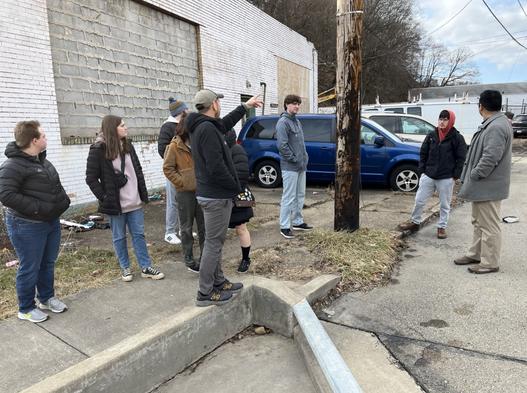
MCSI was honored to colead a breakout session on the important topic of Data Science for Sustainability with RDS scholars Carter Smith, Pip Mostern and Kennedy Aderogba.

Led by Ruth Mostern, this gathering of faculty, researchers, staff, and students was focused on environmental issues and exploring ways to build our capacity for meaningful and impactful environmental discourse. The event was inspired by Pitt’s Year of Discourse and Dialogue and advanced by the Center for Health, Environment, and Engaged Research and Mascaro Center for Sustainable Innovation.



LED BY MCSI LEN PETERS FELLOW TINA NDOH, PUBLIC HEALTH
The 2025 Environmental Series focused on empowering communities and fostering community-academic collaboration through events across neighborhoods in the Pittsburgh region (Homewood, Hazelwood, and Manchester). The series featured three in-person sessions, including one full-day summit and two virtual sessions.

Panelists and training sessions were led by community and academic experts. In total, the five events reached more than 100 unique individuals for a combined 1,220 contact hours.
This event series was a collaboration between Cancer and Environment Network of SW PA, Oasis Farms, 412 Justice, Grounded Strategies, Upstream Pittsburgh, Pittsburgh United, and Freeman Family Farm.

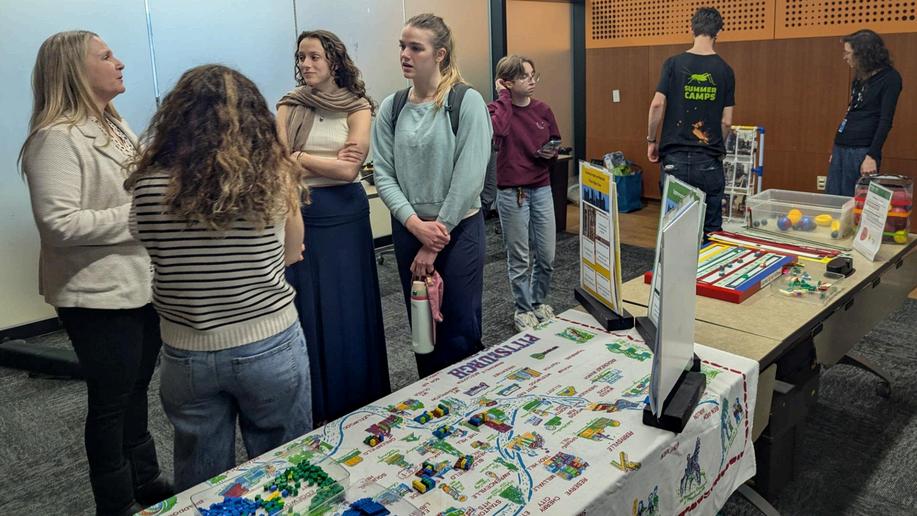

MCSI hosted researchers and science communicators for a panel discussion on the resilient ecosystems on Earth and the wide variety of strategies they use to communicate key findings with different audiences through art, dialogue, and writing.
Panelists included Robin Oliviero of the Kamin Science Center, local visual artist Ashley Cecil, Laurie Giarratani and Jen Sheridan of the Carnegie Museum of Natural History, Mary Ann Steiner of the Learning Research and Developing Center at Pitt, and Pitt faculty Cori RichardsZawacki (Biological Sciences) and Emily Wanderer (Anthropology).

Aaron Henderson is an Associate Professor in the Studio Arts Department at the University of Pittsburgh. His current project, Future Studio, focuses on collaborations between artists and communities to inspire dialogue and foster change. By working directly with local communities, Future Studio creates projects that amplify voices, raise awareness, and address pressing issues.

For the past five years, Henderson’s work has highlighted the ongoing struggle to clear the air and water from decades of pollution and industrial mismanagement. His recent initiatives include large-scale projections in East Palestine, Ohio, addressing the humanitarian crisis following a toxic train derailment and a sculpture designed in collaboration with University of Pittsburgh students to capture the attention of lawmakers. Future Studio has also used projection mapping to bring visibility to the health struggles of those living near U.S. Steel facilities and is beginning a project in Beaver County, Pennsylvania, where a new ethane cracker plant raises fresh environmental concerns.
ANNUALLY RECOGNIZES OUTSTANDING PUBLIC SERVICE CONTRIBUTIONS BY MEMBERS OF THE UNIVERSITY OF PITTSBURGH'S FACULTY.
MCSI ASSOCIATE DIRECTOR DAVID SANCHEZ WAS ONE OF 5 FACULTY CHOSEN IN 2025.

David was recognized for collaborating with local organizations in Beaver County, Homewood, Uniontown, Fayette, and elsewhere to develop programs that help increase community sustainability; focusing research on sustainable design for critical water and agriculture systems and adapting the findings to benefit local and international communities; and creating educational initiatives such as Teach the Teacher workshops which empower educators to incorporate sustainability concepts in their classrooms.


to accelerating climate action in and through higher education, recognized six colleges and universities for their leadership and innovative approaches to addressing climate challenges across five categories—Decarbonization, Justice, Community, Workforce, and Research— alongside a Special Award for Climate Resiliency in Action.
Pitt was honored to be one of the six teams recognized for our Appalachian Bridges to the Future project. This 10-year partnership between the University of Pittsburgh and the Fayette County Cultural Trust is aimed at addressing outmigration while fostering sustainable economic growth. The initiative connects Pitt students with community partners to tackle local challenges through service learning. Collaborating with nearly 100 local organizations, students engage in projects that promote economic resilience with a focus on long-term environmental impact.
The core interdisciplinary faculty team includes: Michael Glass (urban studies), Kristin Kanthak (political science), David Sanchez (engineering) and Bryan Schultz (business).


These annually held awards recognize Pitt students, faculty, staff, and groups who have prioritized sustainability in their work, extracurriculars, and daily lives, both on and off campus. The Office of Sustainability and MCSI honored awardees at the 18th Annual Sustainability Symposium on April 18th, 2025.
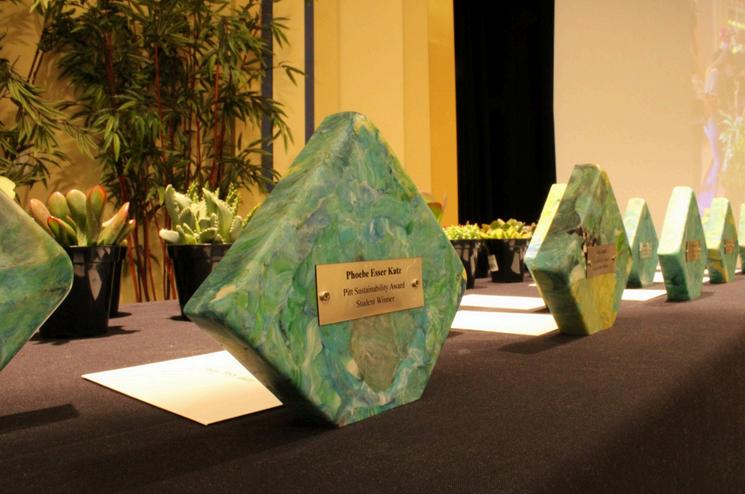



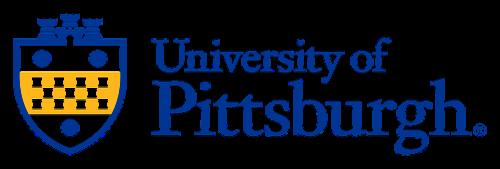








In May 2025, Pittsburgh hosted the annual Housing Innovation Summit at Phipps Conservatory. The event was co-hosted by the Mascaro Center for Sustainable Innovation and the Housing Innovation Alliance, LLC.
Pitt Provost Joseph McCarthy led a keynote speech describing the University's pivotal role in leading sustainable solutions in housing and development. Examples of Pitt's current sustainable development solutions include the Picket Fence Concept Home as well as a new $1 million HUDfunded research partnership led by the Housing Innovation Alliance and MCSI.
Chancellor Joan Gabel kicked off the event with a welcome video, followed by presentations from MCSI's Melissa Bilec, Urban Studies Program Director Michael Glass, and the Center for Sustainable Business' Chris Gassman and John Camillus. Their talks highlighted Pitt's interdisciplinary efforts in shaping the future of housing.







The Pitt te was one of 2025 coho
The AC studen Appala leaders commu
Student teams from engineering, urban studies, political science, and business will build on several years of collaboration in Fayette county to work on applied research projects through the Fayette County Cultural Trust (FCCT) with other county stakeholders (State Reps, Falling Water, Uniontown City Hall, Redevelopment Authority, FC Entrepreneurship Center) to remediate blight, provide education for entrepreneurs and small business owners, build up regional tourism, and measure civic engagement.






Pitt is pro non-profi
sustainab
future lea
Alumni st
newslette
current st
Alumni Car







rk Collins, environmental studies gram coordinator, Department of ology and Environmental Science, trich School
ily Elliott, Department of Geology
d Environmental Science, Dietrich hool
anti Gamper-Rabindran, School of blic and International Affairs
chael Glass, Department of ciology, and director, Urban Studies gram, Dietrich School
rcela Gonzalez Rivas, School of blic and International Affairs
chael Goodhart, Department of itical Science and Gender, Sexuality, d Women’s Studies Program, trich School
bert Kerestes, Department of ctrical and Computer Engineering, anson School
ny Kerzmann, Department of chanical Engineering and Materials ence, Swanson School



Walsh, Department of French and n, Dietrich School
my Weber, School of Public and ational Affairs
Zawacki, Department of Biological ces, and director, Pymatuning atory of Ecology, Dietrich School University



s Goodfellow, sustainability manager, of Business, Hospitality, and Auxiliary
a Hamilton, student sustainability ment manager, Division of Student
s ovalcik, codirector, Mascaro Center for able Innovation
ellum, assistant director of marketing mmunications, Office of Finance and ons
Sharrard, assistant vice chancellor ainability, Office of Sustainability
ullo, vice chancellor, Office of s Management


